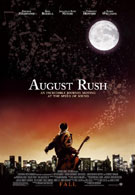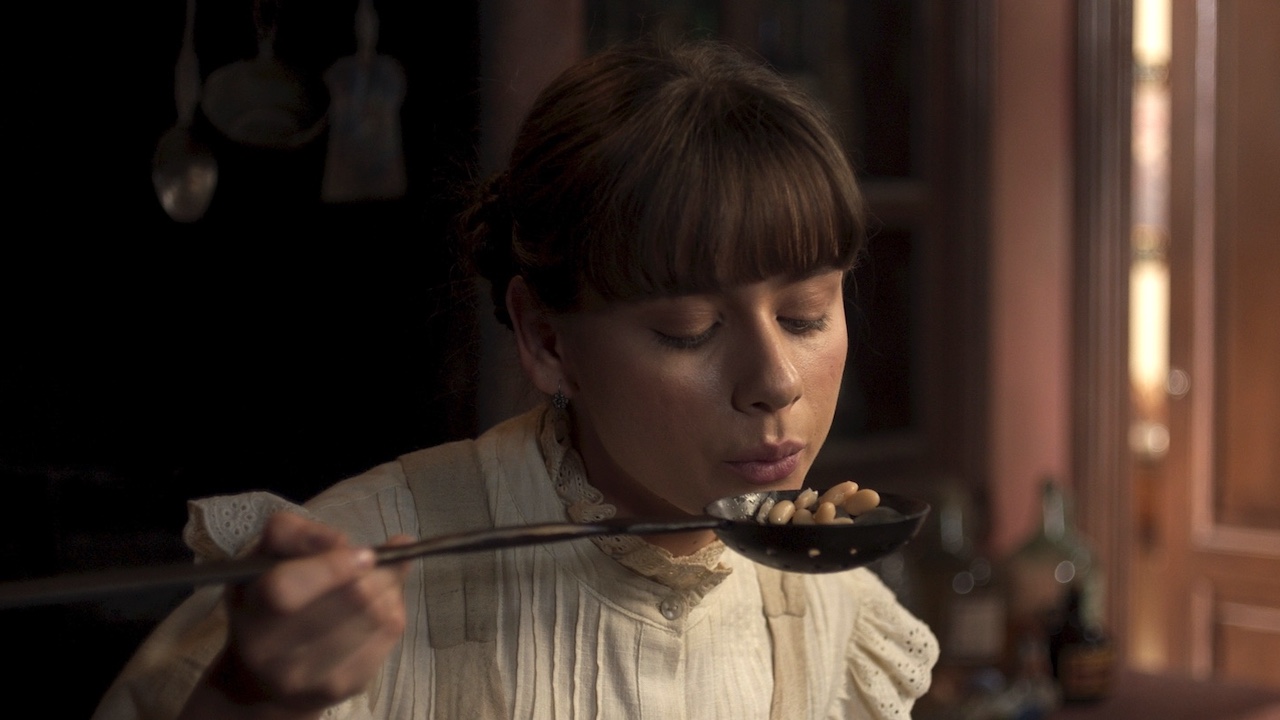August Rush is one of those rare movies that made me dislike it, then won be back over before the end credits roll. It’s not common to see a movie accomplish that roller-coaster ride that turns me away from the picture and then picks me back up, but somehow the story manages it and left me a giddy, sappy mess by the end.
The odd title of the movie comes from the lead character: a young orphan who sneaks away from the orphanage to find his real parents. The kid is convinced that he is still connected to his parents through a mysterious tune that comes to him through just about anything that makes sound, so he sneaks away from the orphanage and into the big city, where he is “adopted” by Wizard (Robin Williams), the leader of a collection of street performing children. Wizard sees the child’s gift for music, which he wants to use for his own personal gain. He renames the kid “August Rush,” and tries to manage the kid’s career. Meanwhile, fate is reuniting August’s biological parents, a concert cellist (Keri Russell) and a rock musician (Jonathan Rhys Meyers), who actually only got together for one night eleven years ago; the night when August was conceived.
As a film that theorizes about a unifying theme in music, August Rush has a bit of a surreal edge to it. The movie breaks occasionally from narrative storytelling to reveal the music that comes from August’s world in slightly surreal editing. It’s slightly gimmicky, especially when you consider that acts like Stomp have been using everyday items for percussion sounds for years now. Oddly, as August actually starts to learn about music, these vignettes become less common. One could almost infer that the more August learns about music, the less he hears it, although I don’t think that’s the point; I think it just coincides with a need for the central story to become the primary focus. I think it could have been handled a little better though, mostly by removing some of the sequences earlier in the film. August hears this tune everywhere. We get it in the first few minutes of the movie, so hammering it home in semi-surreal sequences can be a bit obtrusive.
Of course, you can’t have a movie about music without a decent score, and August Rush’s Mark Mancini delivers one of the most intoxicating soundtracks I’ve heard in recent years. It’s a pretty tall order to ask a composer to come up with a sound for music that sounds like it connects to all humans – the music we’ve all heard somewhere in our dreams but never can truly recreate. Mancini lives up to the idea however, with one of the most intoxicating scores this year. It’s a soundtrack that felt so right, both its use in the picture and on a musical level, that I had to race out and pick up a copy. I can’t offer higher praise than that.
The big downside of the movie is that it is completely derivative. There is almost nothing in here that you’ve not seen before in almost identical stories. Child separated from parents, hoping something in the world will reunite them: An American Tail. Street urchins held together by a cruel gang-leader: Oliver Twist. The notion that some unseen “force” unifies the world: Star Wars. The talented Freddie Highmore (Finding Neverland) even seems to be channeling Haley Joel Osment from about a decade ago. Just about everything in August Rush has been done before, but somehow, it still works and the deeper the movie gets, the more it draws you in to the point that you can look past the derivative nature of the film and enjoy it.
There’s no way to avoid saying it: August Rush is a “feel-good movie” with a bit of a fairy tale element with the story of the forlorn orphan seeking out his parents and finding a world of instant success along the way. Fans of sappy feel-good flicks should love it. It’s not tremendously deep, but it’s still entertaining despite the feeling that all of this has appeared before somewhere else. Even if the story lacks originality, at least the music is enjoyable.
Your Daily Blend of Entertainment News

